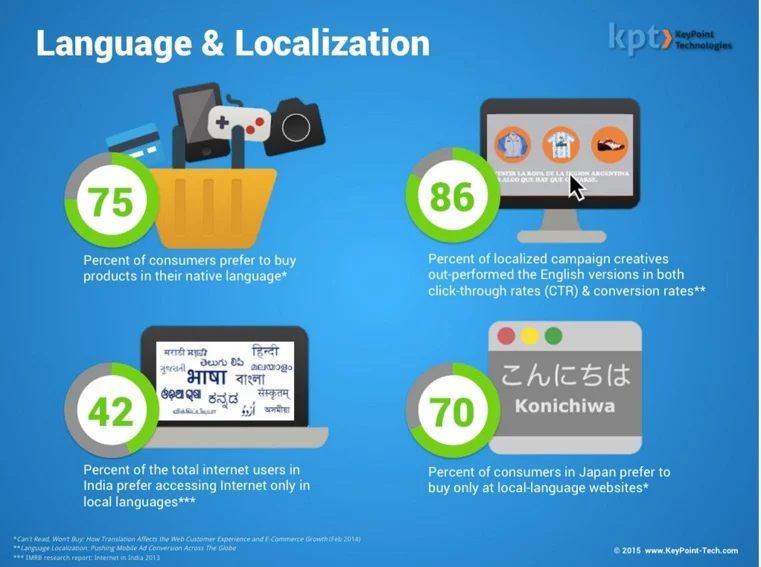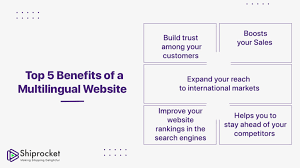
Table of Contents
- 5 Rock-Solid Reasons For Website Translation
- Conclusion
- FAQs
The year 2020 saw us firmly entrenched in the digital era. The internet has changed humanity. COVID has seen a lower than average impact because of enhanced connectivity. The Internet connects the dots that are individual business websites.
Billions of users inhabit the virtual landscape. A large number of them are ESL (English Second Language) users. Several don’t understand English altogether. Now, enter website localization. Web localization is the effort to adapt business and non-business websites to local users. Essentially, website localization is website translation.
There are many solid reasons to translate your website into regional languages. We list them below.

5 Rock-Solid Reasons For Website Translation

1. Your competition makes it necessary
There are two competition-based reasons for translating your website – your competition does not use a translated website, or it does.
If your competition is not currently featuring web localization, you need to get a head start. Differentiate, make website localization your USP.
On the other hand, if your competition has the edge over you with multilingual websites, you need to localize. If you don’t translate your website and give your clients the benefit of a personalized experience, your competition will steal clients from you.
2. SEO and traffic
Your website is only as visible as your SEO makes it. When you translate your website, you reap SEO benefits. Make your website multilingual and see your visibility soar. Translated websites will rank higher for specific SEO keywords, making them more discoverable.
Translated websites are known to boost traffic and increase revenue. Offering a personalized experience to clients in their native tongue increases engagement and goodwill and builds your brand locally.
3. Your business is (or will be) international
If your business operates in foreign markets, it is imperative to speak to the client in their language. Businesses accelerate by providing web localization. It is simply easier for clients to read product descriptions, understand payment options, and finalize shipping in the language they understand best.
In addition, website localization is a trust builder. If you don’t have a translated website, you stand being seen as foreign, alien, and even untrustworthy. Multilingual sites are credible and authoritative and seen as caring for personal experience in foreign markets.
4. Regulatory compliance
Apart from being a best practice, laws in some parts of the world require website localization. If you don’t feature localized content, you may be penalized/fined.
To comply with local laws, you need to translate your website, including the terms and conditions pages and privacy policy.
5. Speak to be understood
Clients naturally trust localized websites. When you speak in their first language, you inspire trust. They naturally engage more with websites that feature their local language. The power of personalized marketing via multilingual websites can’t be overstated.
Website localization is also part of international trust-building. To deliver a truly trustworthy world-class experience, you need to translate your website. When you use web localization, you are speaking to be understood.
Sometimes your web analytics indicate that you need to translate your website. Perhaps a big chunk of your clientele is from abroad. In such cases, translation can give your business momentum. In marketing lingo, web localization expands “brand reach.”
Also, translating your website is a cost-effective way of reaching new audiences. Translated sites have lower bounce rates. Users spend more time on these sites.

Conclusion
Website localization is the need of the hour for international businesses. Translation into multilingual websites increases brand visibility, power, and credibility.
With several competing businesses online, you need to give the client a reason to choose you. The key to growth and content strategy is web localization.
Make the customer feel like a king. Offer them your products and services in the language they love and know best. Gain the benefits of offering a personalized experience at a very reasonable price.
FAQs
Yes, this is because homegrown search engines are gaining in popularity. Your site will rank higher in native-tongue search engines, and thus you reach a wider customer base.
No. Translated websites do not get penalized for duplicate content.
Yes, if you offer website localization and your competitors don’t, this can be a powerful USP for your business.
Web localization should be done in every regional language that your customer comes from or potentially can come from.
You need to iron out your goals, zero in on software, choose a part of the website for the localization menu, and design the language selection menu attractively.
Web translation costs depend on the language being translated into. The per-hour price can vary from $20-$150.
Latest Blogs
Explore how Google’s 2025 AI search updates triggered ranking chaos. Learn actionable strategies to adapt your SEO for AI Overviews, zero-click searches, and SERP volatility. Stay ahead now.
Learn how to rank on AI search engines like ChatGPT, Perplexity, and Gemini by optimizing your content for authority, structure, and relevance. Stay ahead in AI-driven search with this strategic guide.
Explore the best healthcare SEO services for your medical practice. Improve online visibility and effectively reach more patients in need of your services.
Get your hands on the latest news!
Similar Posts

App and Website Translation
4 mins read
27 Tips For App Translation and Localization

App and Website Translation
5 mins read
7 Best Practices Of Translating Apps

App and Website Translation
4 mins read